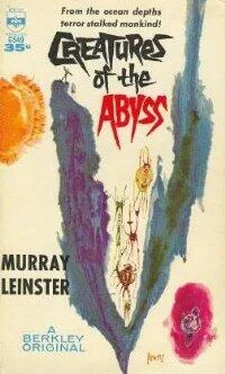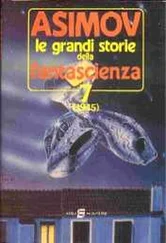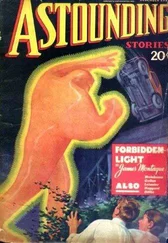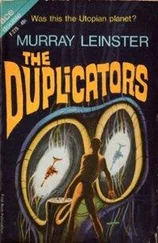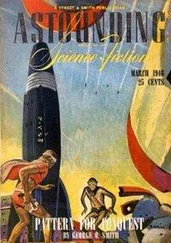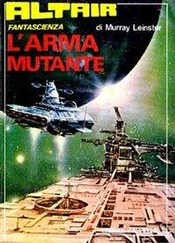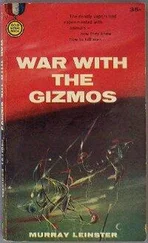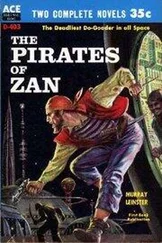Far away to the east, some brightness entered into the paling of the sky. A drab, colorless light spread over the sea. The ocean was a dark, slate blue. Swells flattened abruptly about a quarter-mile away. Terry aimed the sound-weapon and pressed the button. Something gigantic started up, and the top of a huge squid’s mantle pierced the surface. The giant leaped convulsively, high above the water, save for trailing tentacles. It was larger than a whale. It fell back into the sea with a loud splash, and moved away quickly.
Color came into the sky. The sun’s upper rim appeared. Flecks of gold spread upon the sea.
Far, far away at the horizon a dark speck appeared. As the sun climbed up over the edge of the world, the speck turned golden. There was a mist of smoke above it. A plane took off from the ship. Another plane followed.
Fighter planes flashed toward the island. One of them zoomed sharply, like a bird astonished at something it has seen below. It whirled and came back over that spot. There was the rasping whine of a machine gun. Something like a giant snake reared up and fell back again. And now more planes appeared.
Sunrise was suddenly complete. Terry stared out over the sea. And he could not believe his eyes, accustomed as he was to the highly unlikely, now. Giant squids were afloat at the surface. He saw one here, and another there, and another, and another… They were emerging by tens, by scores.
“They’ve been sent up,” said Terry very grimly, “by an entity that didn’t evolve on the earth. They’re… domesticated, in a way. They’re watchdogs for whatever arrives in bolides that fall in the Luzon Deep. They are the reason for the shining circle of sea from which thousands of tons of living fish were drawn down into the abyss. The creatures—the … ellos who listen to what fish and fishermen say—they keep these things as domestic animals. And they have to feed them. Those mooings were the… cries of these things waiting to be fed. Try to imagine that, Deirdre! In the blackness of the pit, in the abyss at the bottom of the sea…”
A tentacle broke surface. Terry swung the sound-beam. A mantle reared above the waves. A bazooka-shell hit it. Something huge and stupid and monstrous fought the inpalpable thing that hurt it. …
Davis approached.
“These,” he said absurdly, “aren’t the creatures who made the plastic objects. Maybe we ought to try to open communication with their masters. Why should we fight? If we prove we can defend ourselves…” think the same way, intelligently. If we landed on another planet, on some part of that planet that the natives didn’t use but we could, it wouldn’t be sensible for those natives to welcome us! Trade with us, perhaps. But let us settle down, no!”
There was a bomb explosion out at sea. A plane had dropped a hundred-pound bomb on a monster at the surface. The flattop was now distinct. Golden, almost horizontal sunlight struck upon it. Off to the west a plane dived steeply, something dropped from it, and the plane levelled off. A three-hundred-foot fountain erupted from the surface. Then there came absolute proof that intelligence lay behind all this. It was not human intelligence, to be sure. Men are tool-using creatures nowadays. They imagine robots for fighting, and nowadays they make them, but many centuries ago men ceased to try to use animals as combatants in war.
The creatures under the sea had not. They’d send up giant squids to do battle with men, as men once sent elephants against the Macedonian army. It was naive. But the generals, the tacticians, the strategists of the Deep did not remain wedded to the one weapon. Already, they saw that beasts could be fought by men. So their instruments of battle changed. Doubtless, orders were given, and five miles under the sea something— something men could not have duplicated—began the transformation of seawater into gas, in quantities past imagining. Tiny, tiny bubbles were produced by some unguessable engine, and rose toward the surface, in a steady stream. At the bottom they were under a pressure of tons to the square inch. But the pressure lessened as they rose, and as they rose they swelled. A bubble which was pinhead-size at the sea-bed grew to be the size of a basketball a half-mile up, and would have been the size of a house a mile up, except that then it separated into smaller ones. They rose and rose and expanded and separated. Five miles up from their origin, at little more than atmospheric pressure, they made a rising column of insubstantiality. At the surface they became foam. But under the foam there was more foam, and under that still more. A ship sailing from normal ocean water into such airy stuff would drop like a stone into the miles-long cone of semi-nothingness. Nothing solid could float there. Nothing substantial could rest its weight upon such rushing thistledown.
And the first of the bubble-weapons appeared at the surface in the form of a patch of foam. Its source—and hence the place of its appearance—could be moved. It could be shifted under any ship, though there would be a time-interval, always, before the foam at the surface was exactly above the gas-generating engine below. It could be moved to anticipate the movements of a ship. But there was always that time-lag.
The Esperance headed back toward the heap of monsters at the break in the reef. Other giant squids emerged and joined the pack. A plane came over and bombed it. The Esperance turned away. The mine layer from Manila appeared at the horizon. The flattop made a sudden violent turn, and more foam appeared upon the water. It curled and writhed and piled up to be ten—twenty—thirty yards in height.
The flattop fired a shell into it. There was a gigantic flash and flame, and for an instant there was no foam, but only peculiarly pock-marked ocean surface, instantly covered by more foam which piled up as before.
“Gas,” said Terry grimly. “Hydrogen. You guessed right, Deirdre!”
Now the flattop shot off plane after plane, as if they were projectiles. They swung in the air and flew low to drop bombs in the now wabbling, moving, sweeping patch of white stuff. It was a huge discoloration of the ocean surface. It was almost in diameter as the flattop’s length. Now the carrier dodged it warily.
There were dull concussions everywhere. Giant squids writhed in death-agonies. White foam-patches appeared here and there—but somehow haphazardly—as if fumbling for the ships. One patch swept close to La Rubia, and that small derelict seemed to tremble. And then the fishing boat touched the very edge of the white stuff, and was engulfed in it. She vanished instantly, as if she had fallen into a hole in the sea. When the foam-patch passed on, the sea was empty.
The effect of the foam, actually, was that of a gigantic, slavering, blind gullet straining to devour. It moved erratically over the surface. Terry called to Deirdre, “Have Nick tell the flattop that the foam only comes up from deep water. If they can get inside the hundred-fathom curve they’re safe! Maybe even five hundred. Maybe more. But the foam only comes up from deep water!”
The mine layer came on from the horizon at topmost speed. Apparently, they had received warning from the carrier, because the ship suddenly began to zig-zag. The carrier itself adopted the unpredictable change-of-course system which had been originally designed to frustrate submarines lying in wait. Both ships adopted it just in time. A ravening area of foam appeared directly before the mine layer’s bow just as she turned aside. The mine layer dumped a mine. Terry saw it go overboard. But it would have five miles to sink before it hit bottom.
Terry called Davis and jerkily explained that the mines would have to be armed when they went overboard—set so that they would explode when they hit bottom. He explained that depth-bombs might be useful against squids, but if they went off at a fixed depth they would be harmless against the enemy which deployed the squids.
Читать дальше
